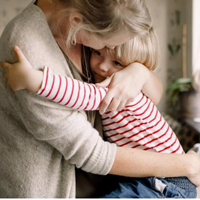
Childrearing
On the Difficulty of Being a Parent
Abstract : Since the publication of Le Génie de l’être, Sylvie Vermeulen’s book-testament, new keys to understanding are available to people who want to accompany their children on a path of benevolence (Sylvie-Béatrice Vermeulen, Le Génie de l’être et autres écrits, Le Hêtre-Myriadis, 2021). What questions of consciousness are hidden behind parenthood?

The resources that allow us to remain benevolent exist, within us and around us: practicing letting go or non-violent communication, setting up times of play-and-listening or emotional release, cultivating our creativity in the family, and so on. Our knowledge of the natural laws governing the development of the baby and the modalities of a proximal parenting are also progressing, as shown for example by the wide interest aroused by affective neurosciences.
But still! These “good practices” are not always easy to implement and each family situation reflects a particular problem, difficult to grasp for the actors concerned. In addition to a deep sense of loneliness, we may feel anxious or angry because, often without our knowledge, these situations reactivate our own powerlessness as children. So how can we see things more clearly?
Subtle interactions
First of all, let’s remember that we are all bearers of a history, both personal and familial. It is a memory of lives made of compromises, of sometimes traumatic adaptations to the injunctions of our educators, internalized from one generation to the next, of experiences shared with more or less happiness. Realizing the strength of these imprints* (expressions followed by an asterisk are defined in the text box below) in us is undoubtedly one of the great challenges of existence, and of parenthood even more so. Why is this so?
Because parent/child relationships are the seat of subtle interactions, the ins and outs of which can defy common sense. Sometimes we want to do the right thing, but our child seems to point out the lack, the incompetence. The temptation is then great to judge his or her behavior, or even to turn against him or her—in short, to fail to grasp the potential for fulfillment that is offered to us. What does children tell us about their own experience? What is it about them that is difficult for us to hear? And how can we open ourselves to the accuracy of what they manifest?
Wonderful guide
First of all, by remembering that the joy of living and discovering characterizes the intuitive consciousness* of the child, from birth. It is a marvelous guide that determines the meaning of his or her impulses towards others and towards the world. And we, as adults, are often so far from it! The simple contact with the spontaneity of a young child can plunge us into the distress of having had to sacrifice our own to parental dictates, to the incessant denial of our life impulses.
The message is all the more inaudible when we are convinced of our legitimacy as parents, of the need to impose certain rules for instance. When a confrontation arises, we can keep in mind that unless we regain our lost sensitivity, we are the spokespersons of our own parents, their faithful servants. And that the reactivity* of our child, closer to his or her deep nature, shows us a way out.
A decisive resolution
On this path of reconciliation with ourselves, introspection is our best ally. It allows us to question* our convictions, to challenge our own experience—to ask ourselves why! We should not underestimate the resolving power of this human space for reflection, nor should we fear the anxiety that this perspective may arouse in us. Sometimes, the good listening of a trusted person is necessary. But on what basis?
The need to understand is at the very heart of human nature, as is the need to realize one’s own potential of awareness. Here again, the infinite curiosity of the child can serve as an example. Unlike the toddler, we are conditioned by our upbringing, invaded by fears that were initially those of our parents. It is therefore not easy to put as a basis the will to regain fluidity of the consciousness that animates us. And yet! Introspection allows us to discern the present from the past, to give back to our educators the undue burden they made us carry. On the condition that we agree to question them.
Welcoming our emotional arousals
When dealing with our children, we are often seized by troubling feelings, ranging from the anxiety of doing the wrong thing to the fear of being judged, to the urgency of making ourselves heard by them. In these cases, we are sometimes surprised by the intensity of our reactions: anger, verbal violence, even acting out can be the result. Our voice is dry, the heat goes to our head, our heart rate accelerates. All these physiological signs indicate that we are invaded by what is called an emotional arousal*.
The disproportionate and sometimes repetitive nature of these disturbing outbursts can be a sign of abuse, the burden of which suddenly resurfaces from the depths of our traumatic memory on account of a trigger*—often the behavior of a child. Taking a step back to accept our feelings, verbalize them and let the underlying emotion* be expressed can allow us to free ourselves from the emotional charge, to restore a bond with our children. Even a very young child can understand that his parent is “caught” in sufferings, if the adult takes the trouble to explain his experience simply, without the intention of making him or her carry it.
The message in re-staging
We can see the importance of making room for emotions, of putting words to our feelings. But not only. The subtleties of our interactions also generate their share of re-enactments*. This expression refers to the often repetitive circumstances of family life, which systematically link to an older, unrecognized experience. Tensions around meals, for example, or over access to screens. By trying to be honest, we can recognize our responsibility as adults in the unfolding of such sequences: an annoyance, a rigidity perhaps to which the children react.
Like the emotional arousals, these are manifestations that indicate to us that work must be done “upstream” in order to return to our educators the childrearing principles that caused us to suffer, and that we no longer wish to reproduce. They imply a clear positioning* on our part with regard to what we have suffered from our parents, in the direction of the well-being of our children, and the recognition of their intuitive awareness. If we can avoid interpreting* their behaviors, as we so frequently do, the accuracy of their feedback will not fail to amaze us.
The issue of consciousness
Each family configuration is unique, but the dynamics that lead to our realizations are similar: confrontation between our expectations and the child’s reality, reaction of refusal, possible reconnection with our own hidden experience, and finally, rediscovery of the joy of living to which we are youths. What Sylvie Vermeulen called the process of realization* inherent in our deepest nature: “The life that the child magnificently represents urges parents to release the tensions that invade family life and hinder from being well together, that is to say, present, conscious and loving.” (Le Génie de l’être, p. 78)
It is then possible to trust our feeling, to rediscover the creativity that is often missing in the apparent disharmony—in short, to reconnect with a sense of meaning. By sincerely looking for what a conflict situation speaks to me, I can surrender to this process and taste the flavor of conscious parenting.
Marc-André Cotton
© M.A. Cotton - 2021.06 / regardconscient.net
Keys to understanding and growing together
An emotion results from the activity of human consciousness in search of resolution. Dealing with our emotions often involves turning against a loved one, especially a child.
Emotional arousal refers to the agitation that invades us when a repressed emotional charge reappears in the present through a trigger.
The imprint is a set of perceptions recorded by the infinite sensitivity of the being in his interactions with his mother, his relatives, and then his family and social environment.
Interpretation is a twisting of reality by parents or other adults about children’s behaviors.
Intuitive consciousness determines the natural relationship of the human being to himself and to his environment. In the child, it is total, therefore fluid and intense.
Positioning is a natural attitude of the human being tending to preserve its integrity, to ensure the satisfaction of its needs and to establish harmonious relations with its fellow men.
The process of realization is a chronology of the unfolding leading to the awareness, more broadly, the dynamics working in this direction.
Questioning is a process of reconnecting suffering to its root cause.
The child’s reactivity is a spontaneous response to a form of aggression directed against its nature.
The re-staging is the manifestation of an individual or collective problem using the stage of existence for its expression.
The trigger designates an element of the present that precipitates a subject into his or her past, which becomes a priority in his or her need for awareness.
(The above expressions are taken from the Lexicon of Le Génie de l’être, op. cit. pp. 253-304).
MCo
